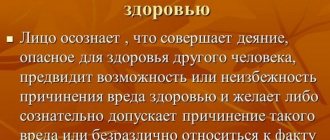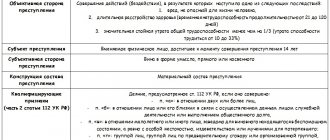1. Intentional infliction of slight harm to health, causing short-term health disorder or minor permanent loss of general ability to work, -
shall be punishable by a fine in the amount of up to forty thousand rubles, or in the amount of the wages or other income of the convicted person for a period of up to three months, or by compulsory labor for a term of up to four hundred eighty hours, or by corrective labor for a term of up to one year, or by arrest for a term of up to four months.
2. The same act committed:
a) for hooligan reasons;
b) for reasons of political, ideological, racial, national or religious hatred or enmity, or for reasons of hatred or enmity towards any social group;
c) using weapons or objects used as weapons;
d) in relation to a person or his relatives in connection with the performance of official activities by this person or the performance of public duty, -
shall be punishable by compulsory labor for a term of up to three hundred sixty hours, or correctional labor for a term of up to one year, or restriction of liberty for a term of up to two years, or forced labor for a term of up to two years, or arrest for a term of up to six months, or imprisonment for a term of up to two years.
- Article 114. Causing grievous or moderate harm to health by exceeding the limits of necessary defense or by exceeding the measures necessary to detain a person who has committed a crime
- Article 116. Beatings
Article 115 of the Criminal Code of the Russian Federation: commentary
Intentional harm to health to a mild degree is established when, as a result of it, a short-term disruption of the functioning of body systems occurs or the victim experiences a persistent but insignificant loss of general ability to work. That is, the victim loses the ability to carry out professional activities for a certain, short period. These consequences can occur simultaneously.
Objective part
It is expressed in the unlawful infliction of mild harm to the health of another person. Thus, the object of the crime, for which Article 115 of the Criminal Code of the Russian Federation provides for liability, is formed by social relations that ensure the safety of citizens. The corpus delicti is formed by:
- Socially dangerous behavior (inaction/action).
- A criminal consequence expressed by causing mild harm to the victim’s body.
- A causal connection established between the act and the resulting disorder or loss of ability to work.
How to hold people accountable?
Contact the nearest police station to write a statement about criminal prosecution, which must contain:
- Full name, number where you can be contacted, address, signature, date.
- Detailed information about the incident: time and place where it happened, the number of criminals, what they did, etc.; Indicate the purpose of the statement, that is, criminal prosecution.
- After this, an inspection will begin and a forensic medical examination will be ordered to determine the presence of harm to health and the degree of severity.
- After all checks, a decision will be made, based on the results of which a criminal case will be opened, or its initiation will be refused.
The issue of causing minor harm to health under the Criminal Code of the Russian Federation is discussed in more detail in our section.
Minor harm
According to paragraph 48, which is present in the rules of forensic medical examination on the severity of harm, a short-term disorder is a health disorder that is directly related to the damage and lasts no more than three weeks (21 days). Minor but permanent disability is defined as a loss of ability to work equal to 5%. This explanation is present in paragraph 49 of the above rules. Mild damage includes, for example, the loss of a finger (except the thumb or index finger), weakened visual and auditory functions, multiple abrasions, bruises, etc.
Qualification
In the case of damage to health, as a result of which short-term, minor consequences occurred that were not expressed in a short-term disruption of body functions, or there is a persistent but insignificant loss of ability to work, sometimes Article 115 of the Criminal Code of the Russian Federation may not be applied. Beatings or torture appear as a more appropriate qualification for such acts (Articles 116, 117). In this case, it is necessary to take into account the means that were used by the criminal. For example, if he used asphyxiating gas, caused harm by using a narcotic substance, etc., the act is not covered by the elements of Art. 116, 117. In this case, it is necessary to recognize as fair the revision of paragraph 20 of the Rules of 1978 with new provisions of 1996. In the current norms of forensic medical examination, paragraph 48 includes the concept of a short-term health disorder, added terms that have only a maximum (up to three weeks) period, without specifying the minimum duration of the consequences (which previously could have been 1 day).
Article 115. Duration of annual basic paid leave
Determination of the Supreme Court of the Russian Federation dated February 28, 2003 N 74-G03-8 This provision of the Federal Law was not taken into account by the court when considering the issue of the legality of clause 1 of Art. 26 of the Law of the Republic of Sakha (Yakutia) “On public service in the Republic of Sakha (Yakutia) (new edition)”, on the basis of which it is possible to provide additional leave in addition to the annual paid leave provided for by labor legislation (according to Part 1 of Article 115 of the Labor Code of the Russian Federation 28 calendar days), i.e. duration less than established by federal law.
Determination of the Supreme Court of the Russian Federation dated January 14, 2004 N 38-G03-12
The prosecutor appealed to the court with the above-mentioned demands, including asking that Art. 26 of the Law of the Tula Region of December 29, 1994 N 7-ZTO “On the status of a deputy of the Tula Regional Duma” as amended on July 10, 2002, according to which a deputy of the regional Duma working on a professional permanent basis is granted annual paid leave of 36 working days days with payment of treatment benefits in the amount of double monthly remuneration. Argues that this norm contradicts Art. Art. 115 and 120 of the Labor Code of the Russian Federation, establishing that annual paid leave is provided to employees for a duration of 28 days and is calculated only in calendar days.
Determination of the Constitutional Court of the Russian Federation dated May 28, 2009 N 933-О-О
1. Citizen A.A. Baikov was forced to work during his stay in the pre-trial detention center; for the periods actually worked, he was paid the appropriate remuneration, and these periods were included in the insurance period for the assignment of a labor pension. A.A. Baykov, considering that suspects and accused of committing crimes in custody, if they are brought to work, should be subject to the provisions of Articles 114, 115, 122, 126, 127 and 157 of the Labor Code of the Russian Federation in terms of providing annual paid leave with retention of place work and average earnings, the duration and frequency of this leave, the possibility of replacing it with monetary compensation, payment of monetary compensation for unused leave upon dismissal, as well as payment for downtime due to the fault of the employer, he contacted the Office of the Pension Fund of the Russian Federation in the Leninsky district of the city of Perm with a corresponding application . Having considered the application, the Department explained to A.A. Baykov that an employment contract was not concluded between him and the pre-trial detention center, he was not included in the staff, and the relations that developed in connection with his involvement in work are regulated by Article 27 of the Federal Law of July 15, 1995 N 103-FZ “On Detention suspected and accused of committing crimes." The applicant was recommended to contact the State Labor Inspectorate in the Perm Territory, which confirmed that the issues of attracting suspects and accused persons to work are regulated by the said Federal Law, which does not provide for the provision of annual paid leave, payment of monetary compensation for unused vacations and payment for forced downtime. The Federal Service for Labor and Employment agreed with this answer, which, citing Article 27 of the Federal Law “On the detention of suspects and accused of committing crimes,” indicated that labor legislation and other acts containing labor law standards do not apply to persons suspected and accused of committing crimes and in custody.
Determination of the Supreme Court of the Russian Federation dated November 29, 2006 N 64-G06-20
Article 115 of the Labor Code of the Russian Federation provides for the provision of annual basic paid leave to employees of 28 calendar days. Having analyzed the content of the above legal provisions, the court rightfully noted that the norms of the Labor Code of the Russian Federation established only the minimum level of labor rights and guarantees for workers, provided by the state.
Resolution of the Supreme Court of the Russian Federation dated March 1, 2017 N 84-AD17-1
5. in violation of Articles 115, 116, 123 of the Labor Code of the Russian Federation, paragraph 5.3 of the collective agreement, vacation schedules for 2014 and 2015 respectively provide for vacations for employees lasting less than 28 calendar days (for 2014 - for cooks, drivers, system administrators, administrators; 2015 - 14 days leave is provided for all employees); for cooks R. and R., neither the vacation schedules nor the employment contracts define the annual additional paid leave provided for by the workplace certification card for working conditions; employees K., M., K.R., A. were not notified, with signature, of the start time no later than two weeks in advance, and were not familiarized with the orders for granting leave;
Determination of the Constitutional Court of the Russian Federation dated December 20, 2018 N 3323-O
Thus, paragraph 4 of Article 39 of the Federal Law “On Service in the Customs Authorities of the Russian Federation”, which provides for limiting the total duration of leave to 60 calendar days (which is significantly more than the duration of annual basic paid leave established by Article 115 of the Labor Code of the Russian Federation), is aimed at achieving a balance public interests and private interests for the purposes of the effective functioning of the customs system, applies equally to all customs officers and cannot be regarded as violating their rights.
Determination of the Judicial Collegium for Civil Cases of the Supreme Court of the Russian Federation dated July 31, 2017 N 81-KG17-9
By virtue of parts one and two of Article 115 of the Labor Code of the Russian Federation, annual basic paid leave is provided to employees for a duration of 28 calendar days. Annual basic paid leave of more than 28 calendar days (extended basic leave) is provided to employees in accordance with the Code and other federal laws.
Determination of the Constitutional Court of the Russian Federation dated October 18, 2012 N 1954-O
The contested provisions, providing persons working under an employment contract in organizations located in an area of residence with a preferential socio-economic status, the right to additional (to other incentive payments provided for by remuneration systems established in accordance with part two of Article 135 of the Labor Code of the Russian Federation) Federation) long service remuneration depending on the length of service in the specified zone, as well as additional annual paid leave of seven calendar days, which is provided to them in addition to the main annual leave guaranteed by Article 115 of the Labor Code of the Russian Federation, are aimed at compensating for the negative impact of psycho-emotional stress related to the Chernobyl disaster, taking into account the legal status of the employee who, in accordance with labor legislation, performs the work entrusted to him with subordination to the internal labor regulations while the employer provides certain conditions for remuneration, as well as compliance with the work and rest regime.
Decision of the Judicial Collegium for Administrative Cases of the Supreme Court of the Russian Federation dated 02/07/2018 N AKPI17-1014
The total duration of the annual basic paid leave of employees is established by Article 115 of the Labor Code of the Russian Federation and is 28 calendar days. The resolution for teaching staff, depending on the position, type of educational organization and other individual features of the activity, established the duration of the annual basic extended paid leave of 42 days or 56 days, which exceeds the total duration of the annual paid leave of employees.
Decision of the Supreme Court of the Russian Federation dated May 25, 2006 N GKPI06-366
At the same time, taking into account that, as a general rule, the duration of vacations is established in calendar days (Article 115 of the Labor Code of the Russian Federation) and by virtue of Part 4 of Article 139 of the Labor Code of the Russian Federation, the average daily earnings for paying vacations and paying compensation for unused vacation are calculated using the average monthly number of calendar days, paragraph 2 of clause 8 of the Regulations also talks about determining the average employee’s earnings by multiplying the average daily earnings by the number of calendar days in the period subject to payment.
Decision of the Supreme Court of the Russian Federation dated July 13, 2006 N GKPI06-637
In accordance with Article 115 of the Labor Code of the Russian Federation, annual basic paid leave is provided to employees for a duration of 28 calendar days. Annual basic paid leave of more than 28 calendar days (extended basic leave) is provided to employees in accordance with this Code and other federal laws.
Duration of the disease
When establishing the duration of the disorder, one should be guided by objective information that characterizes the severity of the injuries caused, and not just by the certificate of incapacity for work. In determining the duration of the disease, the criterion is the necessary time to restore health. If treatment is unjustifiably delayed or ended prematurely, it is necessary to rely not on the actual, but on the necessary time period, which is established by specialists.
Subjective part
It is expressed in deliberate guilt. Article 115 of the Criminal Code of the Russian Federation provides for both direct and indirect intent. As a rule, in a crime it is unspecified (undefined). Article 115 of the Criminal Code is applied if it is proven that the perpetrator wanted to cause damage to the health of the victim to a mild degree, consciously assumed the likelihood of such consequences, or had an indifferent attitude towards them. If the subject wanted to cause death or serious harm, but due to circumstances beyond his control, was unable to realize his intentions, the act is qualified according to the relevant standards (attempted murder or causing serious harm to health). Article 115 of the Criminal Code of the Russian Federation can be applied to acts committed by individuals who have reached 16 years of age.
Corpus delicti
For minor bodily injuries, Article 115 of the Criminal Code of the Russian Federation provides for criminal liability. This crime involves the occurrence of one of the following consequences:
- Damage to organs or systems resulting in temporary loss of performance for up to 21 days inclusive.
- Persistent loss of low degree disability - from 5 to 10%.
If both signs are present, the one with the highest indicator of harm to health is used as a qualifier.
Difference from similar types of crime
If the consequences of the beating manifested themselves in the form of small scratches, bruises, but did not lead to loss of ability to work (or it amounted to less than 5%), the crime will be classified as “battery” under Article 116 of the Criminal Code. This also includes situations where the blows left no marks on the victim’s body. However, in this case, the fact of unlawful actions must be confirmed by witness testimony, recordings from CCTV cameras and other materials.
A longer period of incapacity (greater than three weeks) or a degree greater than 10% is indicative of moderate or severe bodily injury. Liability for these illegal acts is regulated by Articles 112 and 111 of the Criminal Code, respectively. There may also be cases of reclassification of minor harm into more serious harm if it manifests itself after a lapse of time.
For information on causing minor harm to health, see the following video.
Object of the unlawful act
The crime is directed against the integrity of the person and violates the human right to health and well-being. In some cases (depending on the motives), the criminal act is focused on social relations of social strata of the population.
Subject of the crime
Punishment for light battery is imposed on offenders who are over 16 years of age. The offender is a natural person with legal capacity. If the culprit has not reached the age of majority, he is registered with the police department. In this case, all material claims of the injured party are subject to satisfaction by the parents of the minor offender. Additional penalties may be imposed depending on the case materials and the court decision.
Presence of intent
The crime is committed intentionally, with direct or indirect intent. The state of affect does not affect his qualifications. If minor harm to health was involuntarily caused to the victim during detention or within the limits of necessary defense, this act is not subject to criminal punishment.
It is worth noting: in order to qualify the actions of an offender under Article 115 of the Criminal Code of the Russian Federation, it is necessary to reliably establish that he intended to cause minor harm to health or allowed it to occur. If the intention of the perpetrator was to cause grievous harm or the death of the victim, but for certain reasons he managed to inflict only minor bodily injuries, then this act should be considered as causing grievous harm to health or attempted murder.
At the same time, for causing minor harm to health through negligence, the culprit does not bear criminal liability (read about causing harm to health through negligence). However, a civil claim can be brought against him for reimbursement of treatment costs, moral and property damage.






